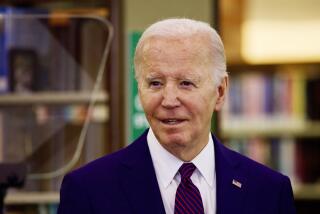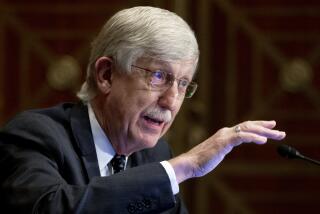Trump administration threatens future of HIV research hub at UC San Francisco
The Trump administration has thrown into doubt a multimillion-dollar research contract to test new treatments for HIV that relies on fetal tissue — work targeted by antiabortion lawmakers and social conservatives aligned with the president.
The turmoil over the National Institutes of Health contract with UCa San Francisco is part of a battle between conservatives opposed to research using fetal tissue and scientists who say the material is vital to developing new therapies for diseases from AIDS to Parkinson’s.
The UCSF research has been instrumental in testing virtually all HIV therapies subsequently approved by the U.S. Food and Drug Administration over decades, and the NIH provides all the support for this work.
Last week, an NIH contracting official told the principal investigator at UCSF that the government was ending the seven-year contract midstream, and that the decision was coming from the “highest levels,” according to a virologist familiar with the events. Five days later, the university received a letter from the AIDS division of NIH’s National Institute for Allergy and Infectious Diseases saying the government would continue the contract for 90 days rather than the expected year-long renewal, with no word of its prospects after that, according to an individual with knowledge of the letter.
The sudden uncertainty about the lab’s future has erupted as federal health officials are reconsidering whether the government should alter its support of research involving fetal tissue “in light of the serious regulatory, moral, and ethical considerations involved,” as they said in September in announcing the review.
In recent weeks, Health and Human Services officials have held sessions with patient advocates, scientific societies, ethicists and leading abortion opponents — to hear their views. HHS officials insist they have not yet made a decision, saying publicly only that they want to expand alternatives.
“This is a pro-life, pro-science administration,” HHS Assistant Secretary for Health Brett Giroir wrote in mid-November to Rep. Mark Meadows (R-N.C.), leader of the House’s conservative Freedom Caucus.
Since President Trump took office, congressional conservatives and anti-abortion activists have ratcheted up pressure on the administration to stop government support of fetal tissue research. They contend that such studies use what they characterize as “body parts” from “unborn babies” and that alternatives exist.
The tissue comes from elective abortions. Researchers say its use has not led to an increase in the prevalence of abortion and has spurred scientific advances that could not have been made otherwise.
Irving Weissman, a pioneer in stem cell research at Stanford University, said the research method used by the UCSF lab “is absolutely essential. There is no substitute today.”
The UCSF research has been a particular target of opponents’ ire. Several dozen lawmakers signed a recent letter asking the administration to cut off its funding. And in recent weeks, a columnist for the conservative website CNSnews.com, wrote repeatedly that the administration had not canceled the contract. The board of the site’s parent company, called the Media Research Center, includes conservative Rebekah Mercer, the leader of a family super PAC that poured money into Trump’s election.
“No final decision has been made,” Oakley said.
Even so, the principal investigator is preparing to shut down the lab, according to the individual familiar with Monday’s letter from NIH to the university’s business office. The Washington Post is not identifying the investigator, who has been involved with HIV research since the mid-1990s. The investigator and university colleagues in AIDS research have been subject to demonization and occasional threats for their work over the years.
Though it promises federal money through March 5, sections of the letter sound like instructions for an orderly closing of a research enterprise. The letter instructs the investigator to “finish ongoing studies as planned,” not to produce new animals for studies and to be ready, if requested later, to return lab animals and equipment to the government.
The contract supports the full-time equivalent of six employees, and university rules require 60 days’ notice before anyone is laid off.
The laboratory is part of the UCSF department of medicine’s experimental medicine section. The government pays the lab to provide a central testing platform for assessing in animals the effectiveness and safety of chemical compounds that seem promising for HIV prevention, treatment and cure from earlier stages of development by drug companies and other academic researchers.
The lab does this testing on what are known as humanized mice. These are mice that start out with deficient immune systems. Tissue from the thymus glands of aborted fetuses are implanted into a capsule in the connective tissue under the mice’s kidneys. In four months, that tissue grows into the equivalent of a human thymus, the site of the body that produces T cells, which become depleted in people — or such mice — infected with the HIV virus.
Using this animal model, the UCSF lab — and an affiliated institute which had similar NIH funding earlier — has evaluated more than 100 chemical compounds from five dozen drug classes.
In some instances, the testing discovered that substances to prevent or treat HIV that seemed promising in a test tube were too toxic in animals. In others, the testing showed great promise, such as a drug that appears likely to block infection for as long as a year that Merck Pharmaceuticals is now developing.
If the administration halts UCSF’s work, Stanford’s Weissman said, “ this is … cutting off a line of research that has been in the past and is likely to be in the future [helpful] to solve the AIDS epidemic.”
Amy Goldstein writes for the Washington Post.






